Apple's iPhone 4: Thoroughly Reviewed
by Brian Klug & Anand Lal Shimpi on June 30, 2010 4:06 AM EST- Posted in
- Smartphones
- Apple
- iPhone 4
- Gadgets
- Mobile
Performance
When the 4 was announced, my curiosity (and perhaps yours as well?) was about the flavor of Apple’s A4 SoC inside the phone. The rumor was that the A4 in the iPhone 4 had a full 512MB of memory, compared to 256MB in the iPad’s A4. iFixit took an iPhone 4 apart (with relative ease I might add) and confirmed the presence of 512MB. Look at the A4 in this picture, the Samsung part number on the right edge of the chip starts out K4X4G. The K4X denotes a Samsung mobile DRAM and the 4G refers to its density: 4Gbit or 512MB.
More memory should mean a smoother multitasking experience on the iPhone 4. Remember that iOS 4 keeps all fast task switching enabled apps resident in memory even after you’ve switched away from them. They are only kicked out of memory if you run low or if you force quit them. With more memory you should be able to keep more apps in memory without unwillingly forcing them out. The 512MB of RAM should also give the OS more breathing room in lighter multitasking scenarios, a problem many are already seeing on the iPhone 3GS running iOS 4. In practice the 4 is smoother when running iOS 4. There are still some hiccups but not as bad as on the 3GS, and definitely not as bad as on the 3G. The OS was clearly designed with the iPhone 4 as the performance target.
The big question that remains is what clock speed the iPhone 4’s A4 is running at. The assumption was 1GHz however Apple was very careful not to mention clock speed, unlike at the iPad launch. Saying nothing usually means there’s nothing good to say.
I ran a whole bunch of benchmarks on the iPhone 4 and the iPhone 3GS running iOS 4 to try and figure out what CPU speed we might be dealing with. The early reviews imply that the A4 in the iPhone 4 is running at a speed greater than the 3GS’s 600MHz, but slower than the iPad’s 1GHz. Let’s try and find out what it’s really running at.
We’ll start with the real world tests, first SunSpider. A javascript performance test this benchmark is completely network independent but it measures the performance of the browser as well as the underlying hardware. It is small enough to make memory size differences negligible so between the two iPhones we should be seeing a pure CPU comparison:
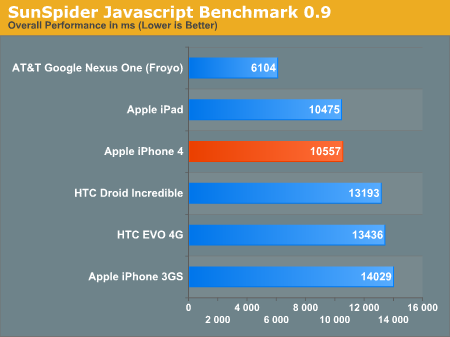
The iPhone 4 manages a time that’s 25% faster. Note that this test is just as much about the software stack as it is about CPU/platform performance. The Froyo update makes the Nexus One ridiculously fast in this benchmark. It just shows you how much room there is to improve performance on these Android handsets. The next leapfrog is going to be once the entire Android world moves to 2.2.
Next up is the Rightware BrowserMark. This test combines JavaScript and HTML rendering performance:
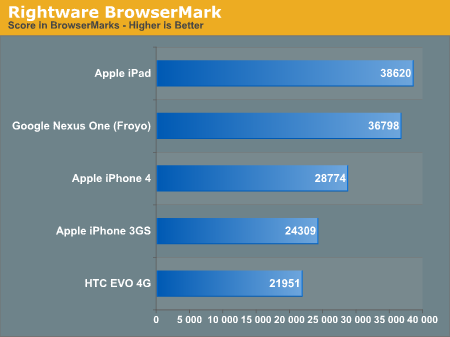
BrowserMark spits out an overall score but with no indication of what the score actually means. In this case we’re looking at 18.4% better performance than the iPhone 3GS. The iPad is 34% faster than the 4, which supports the theory of the A4 running at ~750MHz in the new iPhone.
There's also the possibility that the A4 CPU clock varies depending on load and other factors but the run to run consistency in all of our tests seems to indicate otherwise. We also can't ignore the fact that the iPad and iPhone now run vastly different OS revisions. In some cases iOS 4 actually takes a step back in performance compared to iOS 3.2. That undoubtedly makes the iPad vs. iPhone 4 comparison about much more than CPU performance.
Froyo's improved Javascript performance sends the Nexus One nearly to the top of the list here, only bested by the iPad. While Apple has definitely improved performance with the iPhone 4, it seems that it will only take a software update for Android phones to surpass it.
To measure web browsing performance I downloaded a bunch of different web pages and saved as much of them as possible locally on a server. I used WiFi on all of the devices to connect to my local server and timed average load time. I repeated the test at least 3 times and threw out any unusually high or low numbers. Performance was from a clean restart with no additional programs running in memory.
Note that these numbers aren't comparable to other reviews as we've updated software versions on two of the phones. The iPhone 3GS is now running iOS 4 which resulted in some numbers going up while others went down. And the Google Nexus One is running the officially released build of Android 2.2, codenamed Froyo.
What these tests should show is the overall performance of the platform when all network bottlenecks are removed. Obviously hiding in a tunnel under a lead umbrella will make any phone slow, but we’re looking at peak performance here.
The first test is the new AnandTech front page. Here we’ve got tons of images and HTML, meaning we’re stressing both bandwidth and code parsing speed.
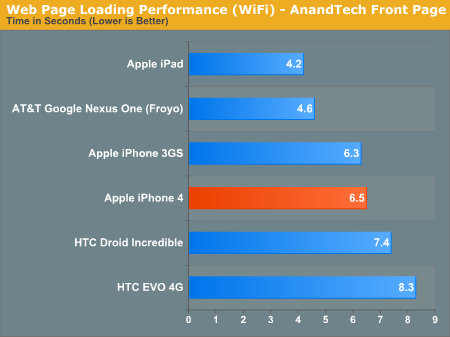
The iPhone 4 is no faster than the 3GS (actually slightly slower, but we'll chalk that up to timing variance) here. The Froyo update to the Nexus One makes it lightning quick, almost as fast as the iPad in our first test.
Next up we have the first page of our recent Zotac XBOX HD-ID11 review. The balance shifts from tons of images to more HTML processing:
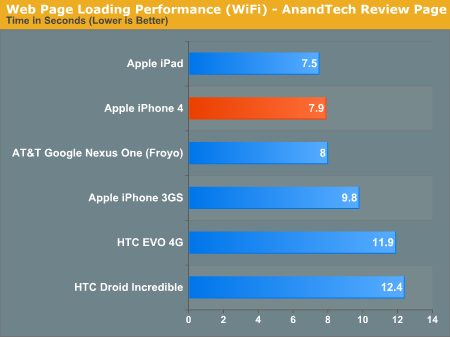
Here we see more of what I expected: the iPhone 4 is around 25% faster than the 3GS running iOS 4. Android 2.2 running on the Nexus One is basically as fast as the 4.
Using our Print this Review function, this next test loads our entire 2010 15-inch Macbook Pro review. While the other two tests had some flash ad content, this one is completely devoid of it so the HTC phones shouldn’t be penalized:
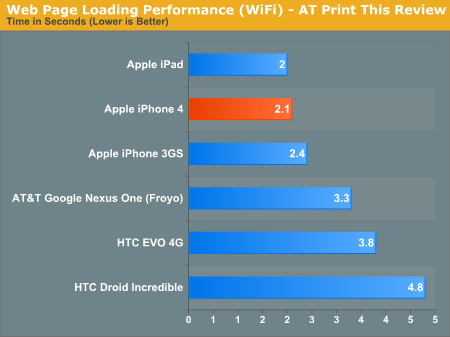
Here the iPhone 4 is 11% faster than the 3GS and about the speed of the iPad. There are other bottlenecks at play here so we don't get further performance scaling. The Froyo update helps the Nexus One a bit but the iOS devices are still quicker.
Our most intensive test is up next with a load of the Engadget front page:
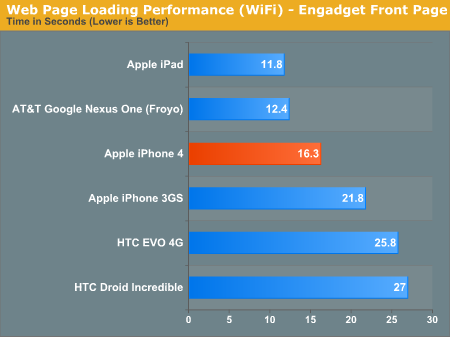
The Nexus One is ahead of the 4 once more with its Froyo update. And the iPhone 4 is 34% faster than the 3GS.
Our most CPU bound test is up next. I put together a custom page with a ton of tabular content and a single page copy of our 15-inch MBP review to make the load take some time at least.
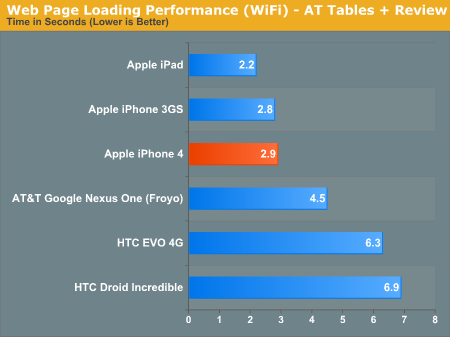
Surprisingly enough there's no difference between the 3GS and the 4 here, perhaps my test is less CPU bound than I thought. Froyo improves the Nexus One's performance a little bit.
Low Level Synthetic Tests
If we assume that we’re mostly CPU bound in all of these cases (a fair assumption given how fast Atom can run through all of these tests), then we’d be looking at a ~750MHz clock speed for the iPhone 4’s A4 assuming no other architectural changes. That’s actually a pretty big assumption. The A4 is widely believed to be a 45nm SoC using an ARM Cortex A8. At 45nm there should be room for a larger L2 cache than what was used in the iPhone 3GS’s SoC.
Perhaps some more synthetic tests will help us figure out what’s going on. I turned to Geekbench, now available in an iOS version.
Geekbench spit out a number of overall results that gave me a good enough summary of what’s going on to make an educated guess:
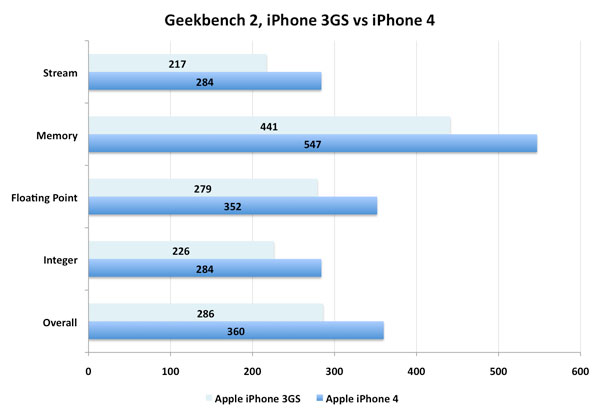
The CPU specific tests all indicate the iPhone 4 is around 25% faster than the iPhone 3GS. That would imply at least a 750MHz clock speed if all else is the same. Assuming we don’t get perfect CPU scaling with all of these tests, I’d venture a guess that 800MHz is more accurate. If the A4 does indeed have larger caches however, Apple could get away with a lower clock speed.
The memory results are particularly telling as they all scale very well going to the iPhone 4, better than the CPU results in fact. This could lend credibility to the theory of larger internal caches or perhaps to an improved (faster) memory subsystem.
Unfortunately until we get the iPad on iOS 4 we can't get a better idea of CPU scaling. I'm not even sure how reliable that will be at this point. If Apple was willing to change the amount of memory the A4 package housed between the iPad and iPhone 4, who is to say that it wouldn't have a slightly different design for the iPhone 4 (e.g. larger caches). The designs may not be physically different but we may instead be looking at binning. Given Apple's unwillingness to talk about the architecture here I think the safest bet is that we're looking at an 800MHz ARM Cortex A8 core in the iPhone 4 and a 1GHz core in the iPad.
Why the lower clock? It's all about battery life.










270 Comments
View All Comments
The0ne - Wednesday, June 30, 2010 - link
Actually, Anand likes the performance of the iPhone and i don't blame him. It is smooth, well implemented and thus makes using it more enjoyable, quantifiable or not. Features be damn, what counts is how a user perceives the device he/she is using. And once attached or rather use to them it's hard to like something that isn't the same or better.For the most part, android OS and WebOS are fine for the vast majority of users. The slight sluggish performance is really not hindering anyone from doing anything practical. It is really just a matter of perception.
As for features and design, I can honestly say unless you been in the design phase yourself many decisions are made prior to production. Missing features such as Flash memory support is a choice left out purposely. Don't kid yourself they are doing it because they either can't or because of lack of money/resources.
mesiah - Thursday, July 1, 2010 - link
I don't agree with the flash memory support. Flash memory is so cheap to implement that it comes on the cheapest of cheap products. And before anyone uses the excuse of "a flash port would clutter up the phone and make it look ugly" Look at the huge ugly connector port used to sync / dock an iphone. Compare that to micro usb. You don't think they could shrink that thing to a quarter of its current size, or less, and add in a flash memory port? Hell, A smart engineer could make a docking port that doubles as a flash memory port (makes me wonder why we haven't seen this yet.) The reason you don't get upgradeable flash memory is the same reason you don't get removeable batteries. There isn't money in batteries and memory, the money is in forcing people with outdated hardware to upgrade.The0ne - Thursday, July 1, 2010 - link
Err, I think u might has misread what I was trying to say. As you've stated flash memory support is very easy and cheap to design in. For Apple not to have it means they have purposely decided against it. For example, creative labs has flash support on some of their PMP devices but it is extremely poor in design that it's unusable. That's the other caveat to just putting features in and not properly supporting it.Anand Lal Shimpi - Wednesday, June 30, 2010 - link
By feature parity I was referring to what's new that made it into iPhone 4: higher res screen, 45nm SoC, much improved battery life, smaller form factor. I'd expect that within the next 6 - 12 months we will see Android phones with similar specs.Software feature wise, Android is at parity in most cases and far ahead in others.
Take care,
Anand
darwinosx - Wednesday, June 30, 2010 - link
They you don't know much about either Android, the iPhone 4, or both.Mumrik - Friday, July 2, 2010 - link
Are you aware that your username undermines every single pro Apple comment you make?Also, I think most of us will take Anand's word for it over an anonymous commenter's.
mmike70 - Sunday, July 4, 2010 - link
Why does it undermine?John Sawyer - Thursday, July 1, 2010 - link
The somewhat larger number of pixels in the Retina display that Apple is using in the iPhone 4, plus its smaller size than the Evo and Droid X displays, do combine to make for a massive difference, as the pictures in the article show. I've compared the two, and the iPhone 4 display really is startlingly good. Many things don't look hugely different between the two, such as some videos, larger graphics and text, etc., but small text (which I look at a lot because that's what a lot of websites serve up) certainly does.semo - Wednesday, June 30, 2010 - link
I'm sorry Anand but I just couldn't bring my self to read your review after yet again detecting your bias towards this product. You come from an engineering background and it shows in your methods of analysis which appeals to me.Do you wait 6 hours in line for a new SSD? I detect hints of emotion in this article's introduction. I could be wrong but I always try to avoid technical reading when I suspect there is bias. It is plain to see on other technical sites where the companies' mission statement is part of the introduction but much more subtle here.
I look forward to your next SSD and chip architecture articles.
bplewis24 - Wednesday, June 30, 2010 - link
Anand is about the most objective Apple iPhone fanboy there is. There is no denying this, and it's both a compliment and a criticism. Until he can stop making subjective generalizations like this:"There is this more open, more configurable, more capable feel you get with Android that you don't with the iPhone. That can be both a positive and a negative. Android phones feel more like computers while iPhones have more of that appliance feel. It still boils down to personal preference, the 4 won't change that."
Really, Anand? Being more open and configurable can be a bad thing? We really need to stop perpetuating this myth that Androids can only be liked by "PC" geeks and people who like to dig deep into the OS. The reality is that Android devices don't force you to customize if you don't want to.
I'm also fairly certain that the "scrolling" issue which isn't present on my Moto Droid has something to do with the live wallpapers eating up CPU processing power. Nevertheless, I don't experience it on my phone and to blanketly imply that the OS UI is clunky (which most iPhone fanboys cling to in every comparison) is completely disingenuous.
Until Anand can rid himself of some of this bias, he will still be known as the best and most objective iPHone reviewer on the interwebs, but the title in and of itself won't be saying very much.
Brandon